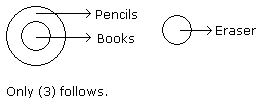Discussion
Home ‣ Verbal Reasoning ‣ Statement and Argument See What Others Are Saying!
- Question
- Statement:
Should sex determination thought ultrasound and female fortitude be made a non- bailable offense?
Arguments:
I. Yes. It must be done instantly.
II. No. Let people enjoy their right of freedom.
Options- A. if only argument I is strong
- B. if only argument II is strong
- C. if either I or II is strong
- D. if neither I nor II is strong
- Correct Answer
- if neither I nor II is strong
ExplanationBoth I and II are weak arguments because the supporting facts to stress 'yes' or 'no' are not up to the mark. They do not concentrate upon the real points in the question.
- 1. NA
Options- A. 1
- B. 9
- C. 48
- D. 16 Discuss
- 2. Find the odd one out:
Options- A. Football
- B. Kho-Kho
- C. Hockey
- D. Carom Discuss
- 3. Find the odd one out:
Options- A. 1593
- B. 3781
- C. 7359
- D. 9175 Discuss
- 4. Poor : Money
Options- A. Weak : Bold
- B. Bold : Dark
- C. Strong : Body
- D. Weak : Strength Discuss
- 5. Statements: All the books are pencils. No pencil is eraser.
Conclusions:
- All the pencils are books.
- Some erasers are books.
- No book is eraser.
- Some books are erasers.
Options- A. Only (3)
- B. Only (1) and (3)
- C. Only (1) and (2)
- D. Only (2) and (3)
- E. Only (3) and (4) Discuss
- 6. NA
Options- A. Fingers
- B. Hands
- C. Ears
- D. Eyes Discuss
- 7. If the expression E < J ? H > Z'. 'H ? Y' and 'E > F' true. Which of the following conclusions will be definitely false?
Options- A. F < Y
- B. Y > E
- C. F < H
- D. J ? Y Discuss
- 8. Brain : Neurology
Options- A. Biology : Animals
- B. Hydrology : water
- C. Body : physiology
- D. Entomology : plants Discuss
- 9. Which two people cannot be a part of the same team?
Options- A. I and J
- B. A and D
- C. B and D
- D. A and C Discuss
- 10. In H + I ÷ L, how is L related to H?
Options- A. Brother
- B. Sister
- C. Cousin
- D. brother-in-law Discuss
More questions
Correct Answer: 48
Explanation:
Only '48' is not square of any number.
Correct Answer: Carom
Explanation:
Carom is an indoor game.
Correct Answer: 3781
Explanation:
3781 is the odd one out as other numbers contain only odd digits.
Correct Answer: Weak : Strength
Explanation:
First indicates the lack of the second.
Correct Answer: Only (3)
Explanation:

Correct Answer: Fingers
Explanation:
All others are two in number.
Correct Answer:
Explanation:
F < E < J ? H > Z H ? Y and Z < H
Correct Answer: Body : physiology
Explanation:
As study of 'Brain ' is called 'Neurology', similarly, 'study' of Body is called 'physiology'.
Correct Answer: A and C
Explanation:
A and C cannot be part of the same team since F has to be always selected with C but never with A.
Correct Answer: brother-in-law
Explanation:
as we don't know the gender of L.
Comments
There are no comments.More in Verbal Reasoning:
Programming
Copyright ©CuriousTab. All rights reserved.
